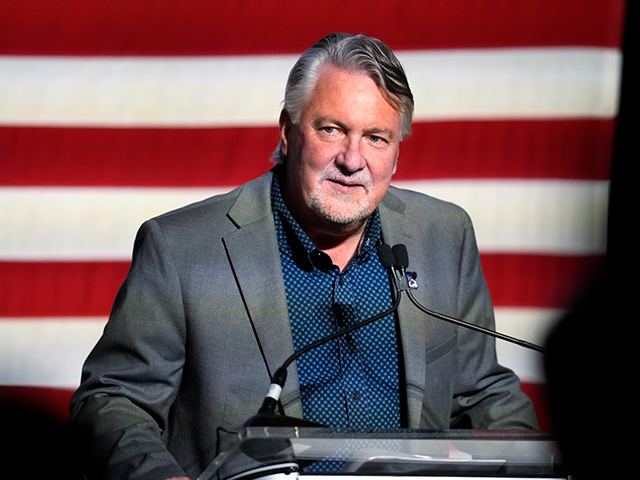The Republican Senate candidate in Colorado is a pro-migration CEO — but he could defeat a founding member of the infamous, nation-threatening 2013 “Gang of Eight” cheap labor and amnesty bill.
The Republican candidate is Joe O’Dea. His opponent, incumbent Democratic Sen. Michael Bennet, joined with Sen. John McCain (R-AZ), Jeff Flake (R-AZ), Sen. Chuck Schumer (D-NY), and Dick Durbin (R-IL) to push the Gang of Eight bill. That bill was so radioactively unpopular that it cost the Democrats five Senate seats in 2020, and also gave Donald Trump the key to his White House win in 2016.
Yet Bennet, a Yale University law graduate and a former investor, is still pushing for a 2023 amnesty and an open-borders bill that would provide his Democrat-allied investor peers with an endless supply of cheap labor to displace millions of Americans from good jobs and decent homes.
“We need to figure out how we … fix a broken immigration system,” Bennet said in June, using the standard euphemism for allowing companies to hire cheap immigrants instead of decently-paid Americans.
In contrast, the GOP candidate, Joe O’Dea supports policies to block illegal migration, even as he declares his support for other pro-migration goals.
“That is a start,” said Rosemary Jenks, the director of government relations for NumbersUSA. She added:
That means that there’s at least a possibility — unlike Senator [Bennet] — that O’Dea would be willing to go along with [a Senate bill] that just dealt with illegal immigration without having to also pass a big amnesty to satisfy the Bennets of the world.
Voting for hope against harm “is rational when you have to pick one or the other — there’s no third option,” Jenks said.

Sen. Michael Bennett (D-CO) (R) eats an ice cream cone while walking in the halls of the Capitol during the budget resolution proceedings on August 10, 2021 in Washington, DC. (Liz Lynch/Getty Images)
The ads for GOP candidate Joe O’Dea show him as an up-by-his-bootstraps blue-collar candidate — but also portray him as an establishment-friendly “moderate” on immigration.
The media’s definition of a “moderate” is a candidate who backs the establishment’s pro-migration policies. Those policies offer little or nothing to Americans who recognize how their wages and housing bills are being damaged by the arrival of yet more illegal and legal migrants.
For example, O’Dea endorses an amnesty for “DACA” migrants brought to the United States while they were children and even an amnesty for the 12 million illegal immigrants in the United States.
In early September, he told Fox News that he supports some form of DACA amnesty and suggested a fast-track naturalization process for many visa workers now holding Fortune 500 jobs:
Those [DACA] kids belong here. They’re Americans … so they should get citizenship. We should also really take a look at our immigration processes in general and clean those up so good people that are working here that are legal … can get through our process.
He uses the same “broken immigration system” jargon used by Bennet and other pro-migration investors and business groups. In April, for example, he insisted “We need … to streamline our broken immigration system.”
The “broken immigration system” phrase is often used by migration advocates who want to legally import millions of foreign workers, consumers, and renters. That flood would be good for CEOs and investors. But it would also reduce Americans’ income, inflate their home prices, and make it difficult for young Americans to get a good career or buy a home.
The key political question is the number of legal and illegal migrants that are allowed into the U.S. each year by the government.
In 2022, Biden has invited at least 2.5 million legal and illegal economic migrants into the United States, just as four million young Americans began looking for work and homes. That migration-caused economic shock curbed Americans’ wage growth and exploded inflation and housing costs.
O’Dea has not challenged Biden’s push to maximize legal and illegal migration. For example, a pro-Democrat website in Colorado reported an exchange where O’Dea dodged a question about immigration numbers from the Associated Press:
AP: “Do you think that we should have more or fewer, or the same, number of legal immigrants in the country?”
O’Dea: “I said in there we need to fix our border, because that’s one issue — it’s fentanyl, it’s human trafficking, it’s cartels, and it’s the illegal immigration. But we also need to fix our immigration system… We’ve gotta fix the immigration system, so good working people can come here. This is a land of immigrants.”
The “land of immigrants” phrase echoes the 1950’s narrative that the United States is primarily a home for migrants, not for native-born Americans.
“Anyone who uses those kinds of cliches in my experience has not given a lot of thought to the issue,” said Jenks.
But O’Dea is “potentially educable,” she said. “Bennet has a [harmful pro-amnesty] record so we know where he is … We don’t know with O’Dea, so there’s hope,” Jenks said.
O’Dea obscures the economic aspect of migration by suggesting the immigration problem can be solved with a border wall — even though Joe Biden’s deputies have let millions of migrants walk through legal loopholes in President Donald Trump’s concrete-and-metal barrier.
Politicians like Michael Bennet have been talking about immigration for over a decade.
All talk, all politics, never any progress for the people.
Wanna secure the border? Wanna protect Dreamers? Wanna build the wall?
Hire a contractor.
I’ll get the job done.
— Joe O'Dea (@ODeaForColorado) August 29, 2022
Kyle Kohli, O’Dea’s press secretary, offered Breitbart News a very small zag back towards voters worried about unending migration:
Joe supports reinstating the remain in Mexico policy. America’s asylum laws cannot continue to be abused by Cartels and fentanyl dealers. We need to secure the border and get the asylum process under control to save American lives.
At the same time, Biden and Bennet’s reckless spending has contributed to a drastic worker shortage and driven up prices for working Americans. Joe believes we need to cut spending and support policies that get allow Americans to get back to work [Emphasis added].
O’Dea’s pro-migration stance is understandable — he needs a huge amount of funding and experienced staffers to compete with Bennet’s pro-investor promises. In 2020, the two contenders in the state’s Senate race spent more than $100 million.
So far, polls show Bennet is comfortably ahead of O’Dea. But one poll shows him just five points behind, and a second poll shows him just one point behind.
O’Dea’s pro-migration pandering leaves him to the left of the House GOP, where GOP leader Rep. Kevin McCarthy has embraced the consensus report on migration reforms pushed by grassroots groups.
But McCarthy stays silent about donors’ demands for more amnesties and more legal migration.
McCarthy also stays silent about the government’s existing migration strategy that skews the nation’s economy towards political donors, coastal investors, and CEOs.
For decades, the government’s strategy of Extraction Migration has pulled in foreign workers to prevent the labor shortages that force employees to raise wages and improve working conditions. This policy was stopped in 2020 and 2021 when Trump’s immigration curbs and the coronavirus disease helped restore a tight labor market. The tight labor market still exists — but only where employers cannot replace Americans with Biden’s wave of illegal migrants. For example, the Colorado Sun reported on August 6:
[Nathan] Nosari said that after searching since January, two things changed. He increased the pay 14% to start at $24 an hour (and top out at $28) and around the same time, a ski resort employee who already lived in the area … was hunting for a new job. “She had to work two jobs to make ends meet [before]. Now she doesn’t. And she’s very happy about that… ,” Nosari said.
O’Dea’s need for donors prevents him from making hanging the “Gang of Eight” bill around Bennet’s neck — or even from making a pocketbook pitch on immigration like some other GOP candidates.
Still, O’Dea — and his impressive wife — are trying to win over the state’s growing population of Hispanic voters. A September 12 report in CPR.org said:
“Joe’s working class story connects with working Americans, Hispanics and Latinos especially,”’ Kyle Kohli, O’Dea’s communications director, said in a statement. “Everyone cares what the grocery bill is and if their community is safe. [President Joe] Biden’s policies and Bennet’s rubber stamp have crushed working people.”
O’Dea has said he hopes to get 60 percent of the Latino vote in the race. That would represent a huge swing in the vote; some reports and exit polls from two years ago showed 70 percent of Latinos supported Colorado’s Democratic Senate candidate John Hickenlooper.
Many integrated third-generation Hispanics largely ignore immigration politics and back the GOP for pocketbook reasons.
For example, many Latino voters show little interest in immigration expansion amid rising inflation and crimes, according to a July-August survey of 2,540 registered Latino voters by two pro-migration advocacy groups. “Immigration reforms” were ranked as the twelfth most important issue after inflation, crime, the economy, healthcare, abortion, rent, and schools, according to the survey.
Still, some Latinos identify as a Democrat-affiliated minority outside the mainstream of Colorado’s mostly European-derived population. For example, CPR.org reported on the race for Colorado’s Eighth Congressional District:
If [Democrat Yadira] Caraveo wins, she would be the first Colorado Latina to go to Congress. And that possibility excites Thornton Democrat Shantell Hernandez, who moved to the area to be around other Latinos.
“This would be a place where we actually have a voice. A lot of places are really Caucasian. And there are a lot of places I don’t see a lot of people that look like me,” she explained. “So I’m really excited that, yeah, you will have a voice, that’s our own voice.”
The pocketbook pitch may work with Latinos and the non-Latino majority in the state.
In June, Bennet acknowledged that his party’s “technocratic” economic policies have not helped ordinary Americans:
What I[‘ve] heard most importantly, over the last 14 years in my town hall, in a state which has one of the most dynamic economies of any state in the country, is that people are killing themselves — that’s the word they use — they’re killing themselves and no matter what they do they can’t afford some combination of housing, health care, higher education or early childhood education. They can’t save.
Bennet downplayed the impact of migration, but validated the populist criticism of the establishment’s high-migration/low wage economic policy:
One of our challenges as a country is that we’ve given up investing in our own economy. We stopped investing in our people. We stopped investing in our plant and equipment here. We don’t make these investments anymore. We pay dividends to shareholders, we buy back stock, we financially engineer — but we don’t do the stuff that actually creates environments … where people — working next to automated robots, it must be said these days — have the chance to have the dignity of work. That’s something we could change.
That leaves immigration-minded GOP voters dangling between two candidates with different levels of pro-migration policies.
“There’s never going to be a candidate on either side who is exactly what every voter wants — it’s just not going to happen,” said Jenks. But, she added, “you have to choose which one you think will better represent your principles.”

COMMENTS
Please let us know if you're having issues with commenting.